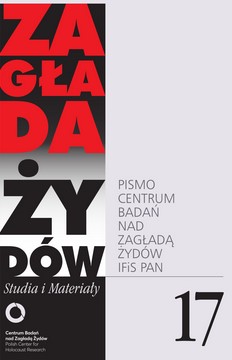W poszukiwaniu lokalnej pamięci o Zagładzie. Przypadek upamiętniania społeczności żydowskich w mniejszych miejscowościach we współczesnej Polsce
In search of local memory of the Holocaust. A case of commemorating Jewish communities in smaller towns in contemporary Poland
Author(s): Marta Duch-DyngoszSubject(s): Studies in violence and power, WW II and following years (1940 - 1949), History of the Holocaust, History of Antisemitism, Politics of History/Memory, Peace and Conflict Studies
Published by: Stowarzyszenie Centrum Badań nad Zagładą Żydów & IFiS PAN
Keywords: memory of the Holocaust; community of memory; Jewish heritage; Bobowa; Dąbrowa Tarnowska; Rymanów;
Summary/Abstract: In the article I analyzed different strategies of representing the Holocaust in initiatives commemorating Jewish communities in local Poland. The annihilation of the Jews is the example of a difficult memory. The social phenomenon undermines the group values and social norms. With regard to local communities the difficult memory has often stemmed from the experience of “being close to the Shoah”. The particular position toward suffering of Jewish community had become a ground for varied attitudes of (co)responsibility and (co)participation of members of local communities regarding the Holocaust. Generally, memory about those events was subject of a vernacular transmission after the war, yet it didn’t become public one. In the consequence, in towns inhabited by numerous Jewish communities till the Holocaust, a specific community of memory had been shaped aftermath: characterized mainly by conspiracy of silence regarding Jewish history and culture. Yet, in the recent time in those social spaces one may observe more and more commemorative initiatives which has been invoking various aspects of the local Jewish heritage. Usually, in commemorative practices and products a group portraits itself. Thus, referring – by almost exclusively non-Jewish social actors – to Jewish history and culture has raised some ethical concerns. In the article I took into consideration form, content and social actors involved in selected commemorative practices (such as days of memory, lectures, walks, performances) and commemorative products (books, documentaries, inhibits of local museums, memorials) which concern the annihilation of the Jewish community. It enabled me to characterize a self-perception (actual or desired) of a group in the context of invoked history of the Holocaust. Important was what in this specific representation of the past remained absent or silenced. In the article I distinguished three strategies of representing the annihilation of the Jews, which are as follows: 1) neutralizing and closing up difficult themes; 2) counterbalancing, excluding and subordinating history of the Shoah; 3) including and recognizing the Jewish memory. I applied critical discourse analysis referring to Elżbieta Janicka and Tomasz Żukowski’s study of philosemitic violence, among others.
Journal: Zagłada Żydów. Studia i Materiały
- Issue Year: 2021
- Issue No: 17
- Page Range: 435-462
- Page Count: 28
- Language: Polish

